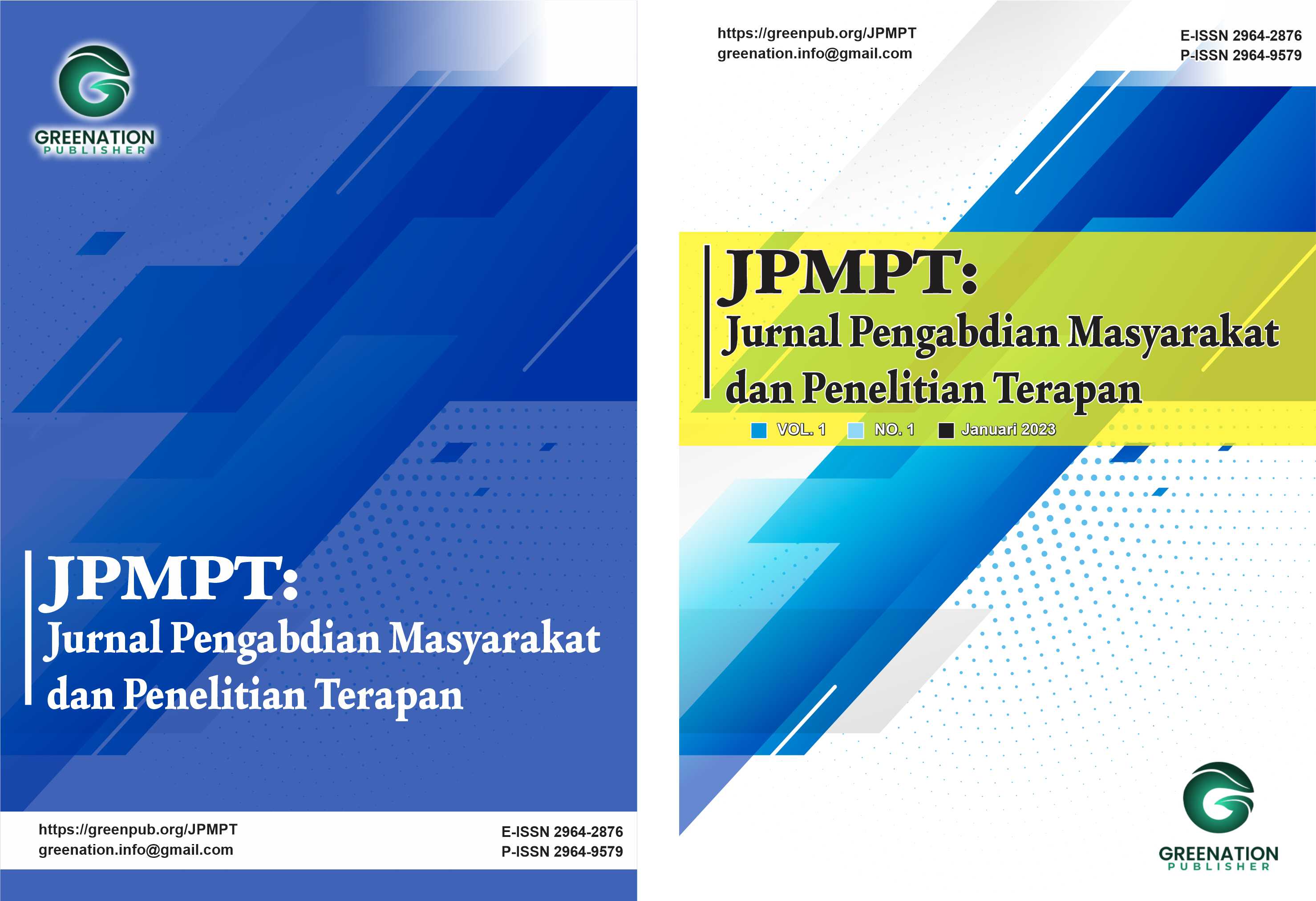Sosialisasi Tantangan Implementasi Logistik Halal di Indonesia
DOI:
https://doi.org/10.38035/jpmpt.v2i3.632Keywords:
Logistik Halal, Rantai Pasok Halal, Freight Forwarder, TraceabilityAbstract
Potensi global yang signifikan dari pasar halal, sangat dianjurkan bahwa penyedia layanan logistik secara aktif berkontribusi pada pengembangan industri rantai pasokan halal. Namun, hanya beberapa perusahaan logistik yang telah mendapatkan sertifikasi halal. Tim ini melakukan inisiatif outreach di beberapa organisasi penyedia layanan logistik untuk mendidik mereka tentang kebutuhan untuk mempertahankan integritas halal di seluruh rantai pasokan. Salah satu hasil dari partisipasi dalam Program Layanan Komunitas ini adalah kesempatan untuk secara langsung berinteraksi dan memiliki percakapan dengan pendiri dan dewan direktur perusahaan logistik. Perusahaan-perusahaan didorong untuk mempercepat adopsi sertifikasi halal karena program pemerintah yang mengharuskan sertifikasi halal untuk produk makanan dan minuman pada bulan Oktober 2024. Ketika datang untuk menerapkan rantai pasokan halal, perusahaan harus memiliki persyaratan tertentu, termasuk kemampuan daya telusur dalam produk mereka. Untuk mendukung kemampuan ini secara memadai, fasilitas dan infrastruktur yang diperlukan harus didirikan.
References
Anggraeni, E., Normasyhuri, K., & ... (2024). Islamic Branding and Product Ingredients: Non-Muslim Dilemma in Consuming Halal Meat. International Journal of …, 6(1), 48–65. https://doi.org/10.35313/ijabr.v6i01.352
Fitri, R., Sudarmiatin, S., & Zonna Lia, D. A. (2023). Urgency of Halal Certification on the Performance of MSMEs. Journal of Economics, Finance and Management Studies, 06(10), 4775–4782. https://doi.org/10.47191/jefms/v6-i10-12
Halal World Institute. (2024). Halal Food Market, Size, Global Forecast 2024. https://halalworldinstitute.org/en/news/institute-news/item/119-halal-food-market,-size,-global-forecast-2024-a-$4,569-69-billion-industry-by-2030-key-trends,-share,-growth,-insight,-impact-of-inflation,-company-analysis.html#:~:text=The increasing Muslim populace globally is significantly contributing to the marketplace’s increase.
Ismail, S., Nazarudin, N., & Muhamad, M. Z. (2022). Governance of Halal Logistics Compliance. Journal of Contemporary Islamic Studies, 8(3), 1–20. https://doi.org/10.24191/jcis.v8i3.6
Khan, M., Najmi, A., Ahmed, W., & Aman, A. (2019). The role of consumer willingness to pay for halal certification in Pakistan. Journal of Islamic Marketing, 10(4), 1230–1244. https://doi.org/10.1108/JIMA-09-2018-0155
Kurniawan, J., Widyastuti Pratiwi, S., Hanif Izzuddin, J., Kukuh Prasetyo, A., A. Nasution, N., Iqbal Firdaus, M., & Gafar, A. (2023). The Implementation of `Halal Logistics’ During the COVID-19 Pandemic to Optimize the Transportation of Halal Products at PT BGR Logistics, Jakarta. KnE Social Sciences, 2023, 806–817. https://doi.org/10.18502/kss.v8i9.13394
Kurniawan, M., Suparno, S., & Vanany, I. (2023). Implementation blockchain technology and the internet of things in halal supply chain traceability and food safety: A systematic literature review. Proceeding International Conference of Technology on Community and Environmental Development, 1(2), 588–599. https://doi.org/10.18196/ictced.v1i2.75
Lestari, Y. D., Susanto, J. M., Simatupang, T. M., & Yudoko, G. (2018). Intention towards halal logistics: A case study of Indonesian consumers. Journal for Global Business Advancement, 11(1), 22–40. https://doi.org/10.1504/JGBA.2018.093184
Muhamad, N. A., Kamarulzaman, N. H., & Nawi, N. M. (2020). Agro-food SMEs’ intention to adopt halal traceability system. Food Research, 4, 93–98. https://doi.org/10.26656/fr.2017.4(S1).S28
Muhamed, A. A., Mat Halif, M., Abu Bakar, M. Z., Hassan, M. F., & Abd Rahim, N. N. (2022). Non-Conventional Strategic Supply Chain Management towards Halal Perspective. International Journal of Academic Research in Business and Social Sciences, 12(1). https://doi.org/10.6007/ijarbss/v12-i1/12078
Muneeza, A., & Mustapha, Z. (2021). Halal certification process for fisheries products in Maldives. Journal of Islamic Marketing, 12(2), 451–466. https://doi.org/10.1108/JIMA-02-2019-0035
Novitasari, W., Samosir, B. S., Habibi, H., & Harahap, E. (2024). Halal Certification Literacy for MSME Enterprises ’Aisyiyah Tranting Market Sipirok. Aktual: Jurnal Pengabdian Kepada Masyarakat, 2(1), 27–32. https://doi.org/10.58723/aktual.v2i1.118
Qosim, N. (2022). Shift of Trend of Research Topic of Global Halal Food and Blockchain And Where They Are The Most Popular. Journal of Halal Product and Research, 5(2), 43–51. https://doi.org/10.20473/jhpr.vol.5-issue.2.43-51
Santosa, C. W., Fahma, F., & Damayanti, R. W. (2022). Effect of Halal Certification on Logistic Performance and Financial Performance. Jurnal Teknik Industri, 24(2), 117–128. https://doi.org/10.9744/jti.24.2.117-128
Selim, N. I. I. B., Zailani, S., Aziz, A. A., & Rahman, M. K. (2022). Halal logistic services, trust and satisfaction amongst Malaysian 3PL service providers. Journal of Islamic Marketing, 13(1), 81–99. https://doi.org/10.1108/JIMA-05-2018-0088
Vikaliana, R., Iskandar, Y. A., & Ikhwanissa, R. (2024). Halal Supply Chain Performance Measurement Model Involving Traceability Aspects: A Study in A Chicken Slaughterhouse. IOP Conference Series: Earth and Environmental Science, 1358(1). https://doi.org/10.1088/1755-1315/1358/1/012030
Zailani, S., Iranmanesh, M., Aziz, A. A., & Kanapathy, K. (2017). Halal logistics opportunities and challenges. Journal of Islamic Marketing, 8(1), 127–139. https://doi.org/10.1108/JIMA-04-2015-0028
Downloads
Published
Issue
Section
License
Copyright (c) 2024 Sekar Widyastuti Pratiwi, Euis Saribanon, Nofrisel, Apsada Juhri, Wahyu Poncotoyo

This work is licensed under a Creative Commons Attribution 4.0 International License.
Hak cipta :
Penulis yang mempublikasikan manuskripnya di jurnal ini menyetujui ketentuan berikut:
- Hak cipta pada setiap artikel adalah milik penulis.
- Penulis mengakui bahwa Jurnal Pengabdian Masyarakat dan Penelitian Terapan (JPMPT) berhak menjadi yang pertama menerbitkan dengan lisensi Creative Commons Attribution 4.0 International (Attribution 4.0 International CC BY 4.0) .
- Penulis dapat mengirimkan artikel secara terpisah, mengatur distribusi non-eksklusif manuskrip yang telah diterbitkan dalam jurnal ini ke versi lain (misalnya, dikirim ke repositori institusi penulis, publikasi ke dalam buku, dll.), dengan mengakui bahwa manuskrip telah diterbitkan pertama kali di JPMPT.


























